仁爱版2018年中考英语一轮教材专题练习八年级上册 Unit 3(解析版)
文档属性
| 名称 | 仁爱版2018年中考英语一轮教材专题练习八年级上册 Unit 3(解析版) | 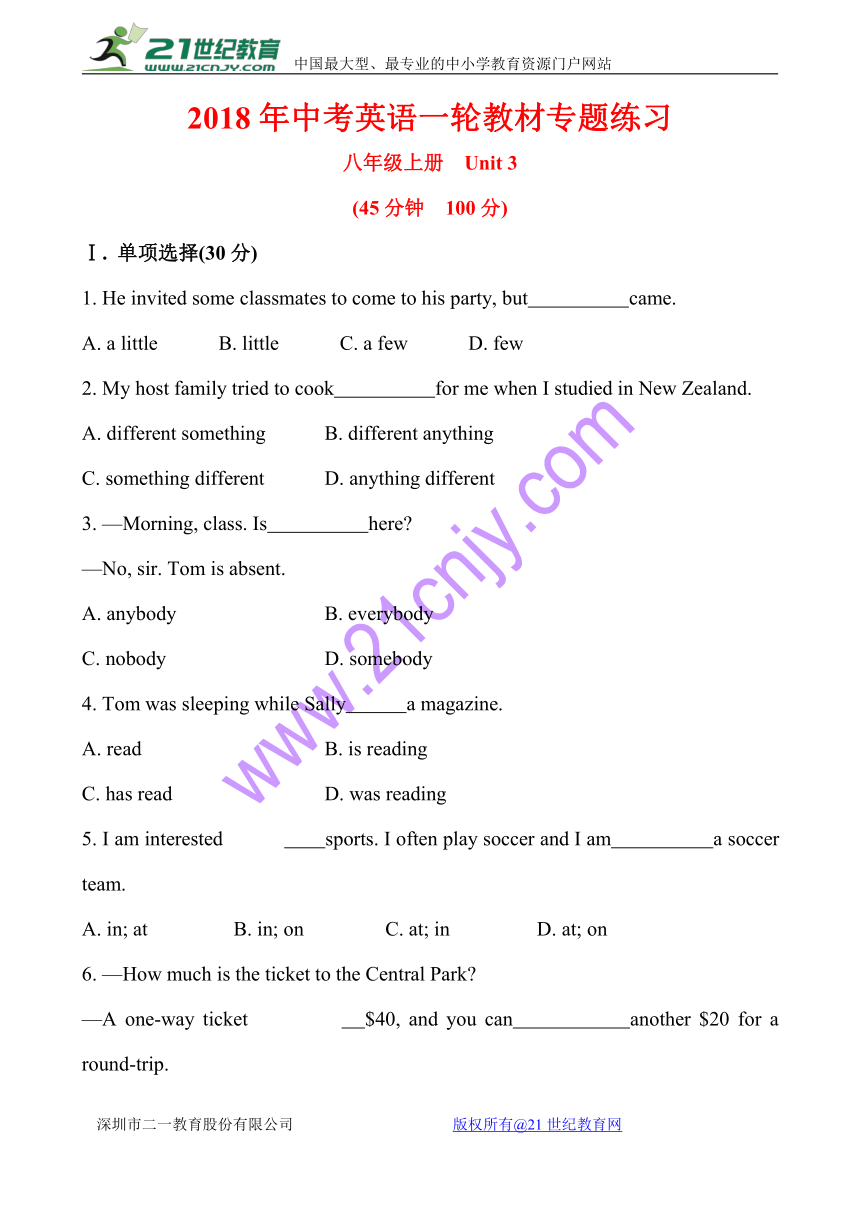 | |
| 格式 | zip | ||
| 文件大小 | 165.9KB | ||
| 资源类型 | 教案 | ||
| 版本资源 | 仁爱科普版 | ||
| 科目 | 英语 | ||
| 更新时间 | 2018-01-08 14:28:01 | ||
图片预览

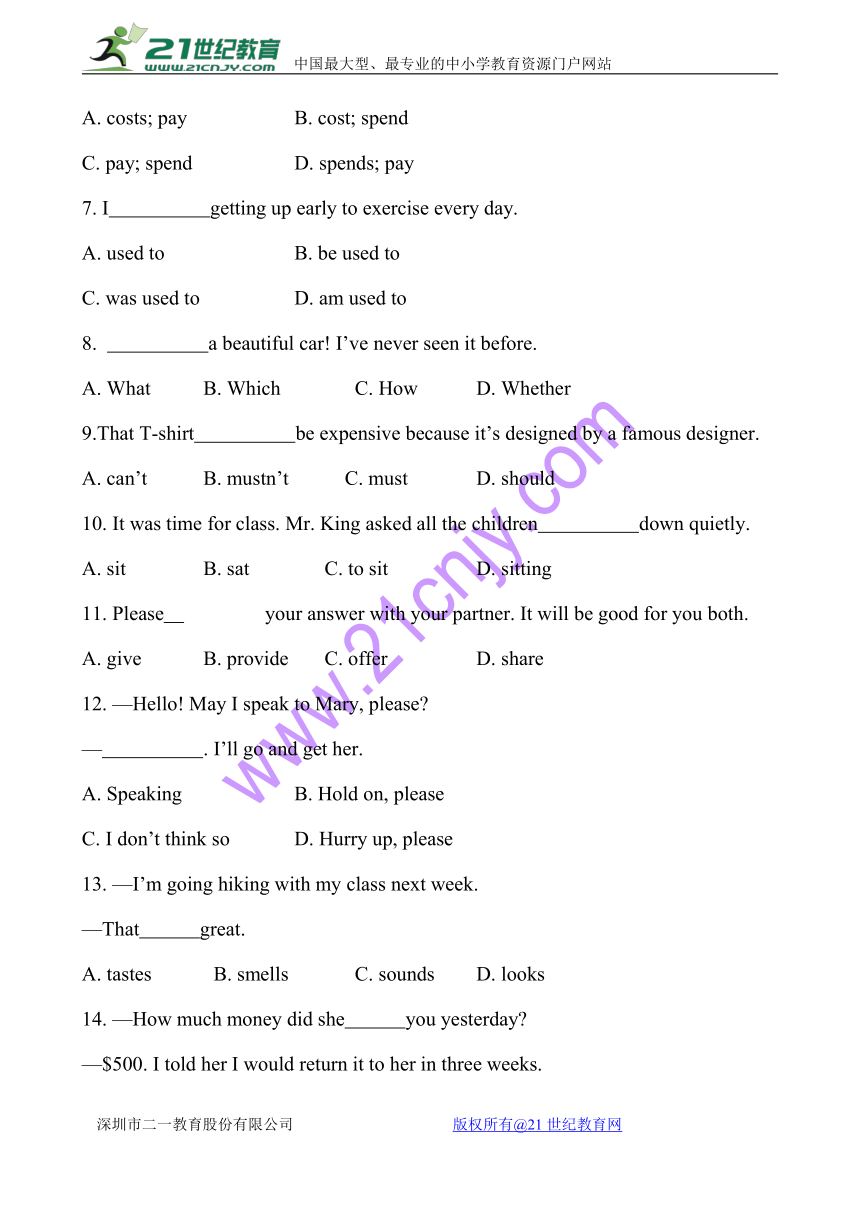
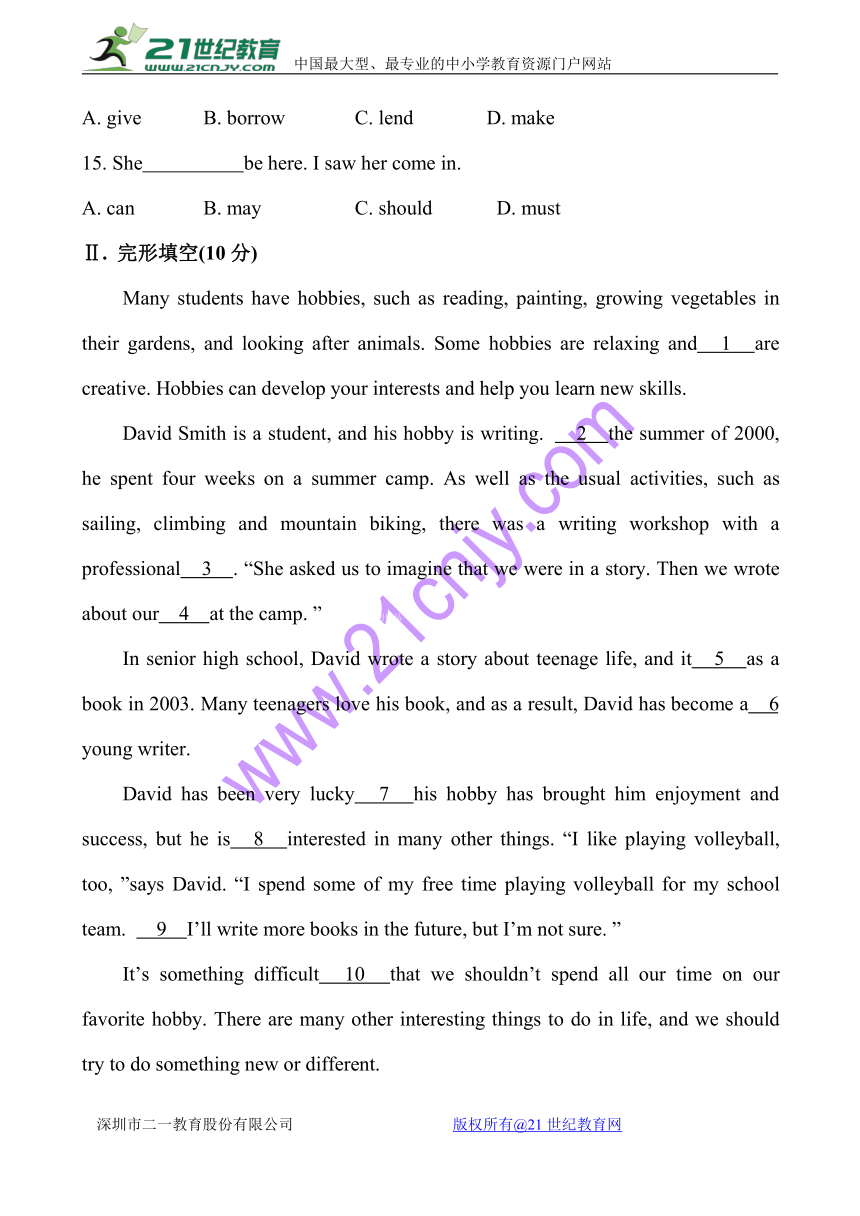
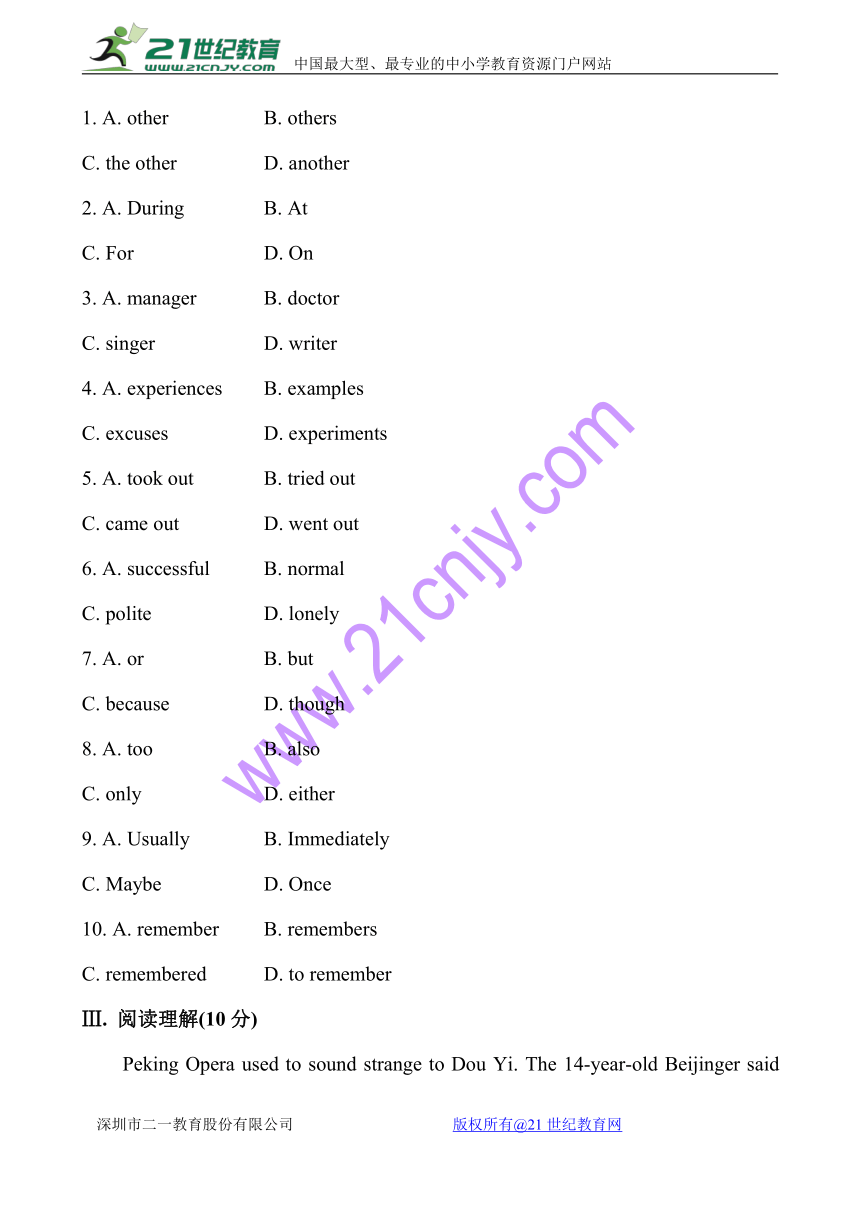
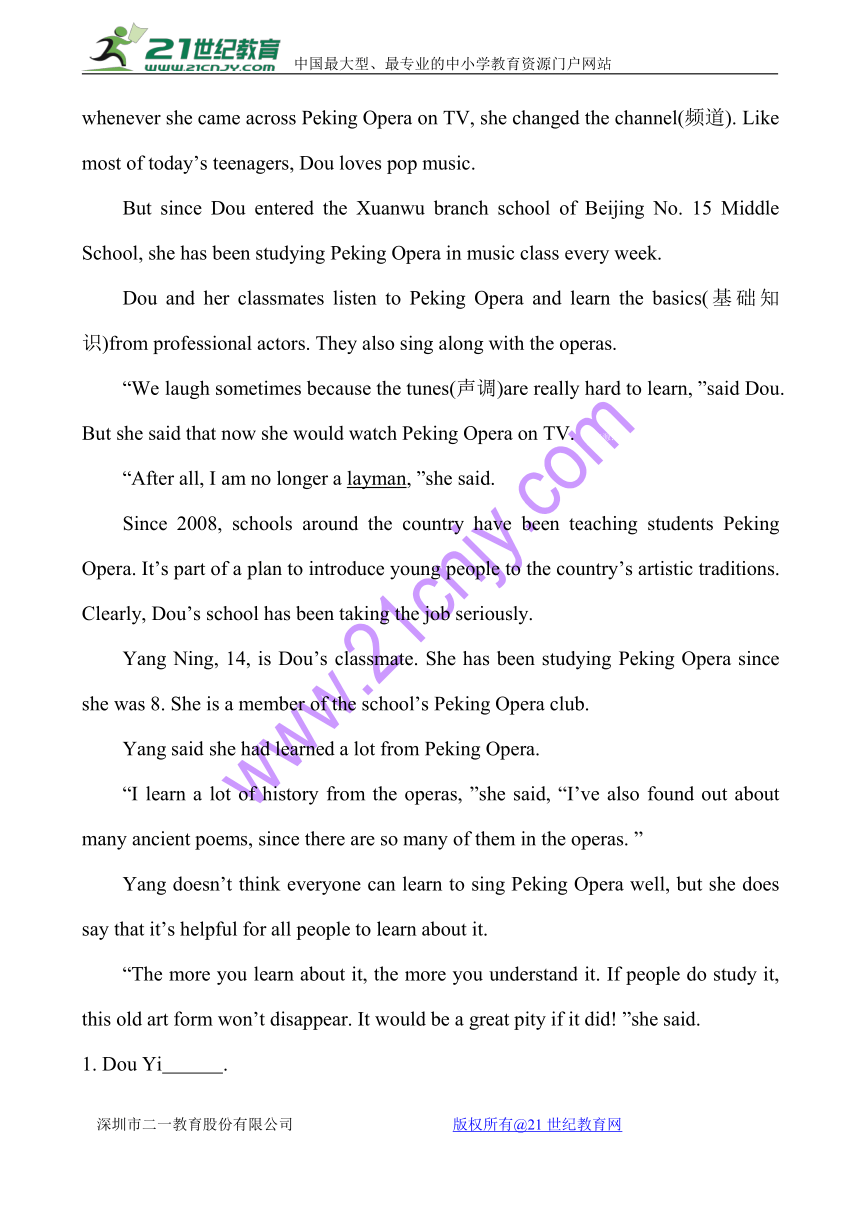
文档简介
2018年中考英语一轮教材专题练习
八年级上册 Unit 3
(45分钟 100分)
Ⅰ. 单项选择(30分)
1. He invited some classmates to come to his party, but came.
A. a little B. little C. a few D. few
2. My host family tried to cook for me when I studied in New Zealand.
A. different something B. different anything
C. something different D. anything different
3. —Morning, class. Is here?
—No, sir. Tom is absent.
A. anybody B. everybody
C. nobody D. somebody
4. Tom was sleeping while Sally a magazine.
A. read B. is reading
C. has read D. was reading
5. I am interested sports. I often play soccer and I am a soccer team. 21世纪教育网版权所有
A. in; at B. in; on C. at; in D. at; on
6. —How much is the ticket to the Central Park?
—A one-way ticket $40, and you can another $20 for a round-trip. 21*cnjy*com
A. costs; pay B. cost; spend
C. pay; spend D. spends; pay
7. I getting up early to exercise every day.
A. used to B. be used to
C. was used to D. am used to
8. a beautiful car! I’ve never seen it before. 21·cn·jy·com
A. What B. Which C. How D. Whether
9.That T-shirt be expensive because it’s designed by a famous designer.
A. can’t B. mustn’t C. must D. should
10. It was time for class. Mr. King asked all the children down quietly.
A. sit B. sat C. to sit D. sitting
11. Please your answer with your partner. It will be good for you both.
A. give B. provide C. offer D. share
12. —Hello! May I speak to Mary, please?
— . I’ll go and get her.
A. Speaking B. Hold on, please
C. I don’t think so D. Hurry up, please
13. —I’m going hiking with my class next week.
—That great.
A. tastes B. smells C. sounds D. looks
14. —How much money did she you yesterday?
—$500. I told her I would return it to her in three weeks. 21cnjy.com
A. give B. borrow C. lend D. make
15. She be here. I saw her come in.
A. can B. may C. should D. must
Ⅱ. 完形填空(10分)
Many students have hobbies, such as reading, painting, growing vegetables in their gardens, and looking after animals. Some hobbies are relaxing and 1 are creative. Hobbies can develop your interests and help you learn new skills.
David Smith is a student, and his hobby is writing. 2 the summer of 2000, he spent four weeks on a summer camp. As well as the usual activities, such as sailing, climbing and mountain biking, there was a writing workshop with a professional 3 . “She asked us to imagine that we were in a story. Then we wrote about our 4 at the camp. ”21教育名师原创作品
In senior high school, David wrote a story about teenage life, and it 5 as a book in 2003. Many teenagers love his book, and as a result, David has become a 6 young writer. 21*cnjy*com
David has been very lucky 7 his hobby has brought him enjoyment and success, but he is 8 interested in many other things. “I like playing volleyball, too, ”says David. “I spend some of my free time playing volleyball for my school team. 9 I’ll write more books in the future, but I’m not sure. ”2·1·c·n·j·y
It’s something difficult 10 that we shouldn’t spend all our time on our favorite hobby. There are many other interesting things to do in life, and we should try to do something new or different.
1. A. other B. others
C. the other D. another
2. A. During B. At
C. For D. On
3. A. manager B. doctor
C. singer D. writer
4. A. experiences B. examples
C. excuses D. experiments
5. A. took out B. tried out
C. came out D. went out
6. A. successful B. normal
C. polite D. lonely
7. A. or B. but
C. because D. though
8. A. too B. also
C. only D. either
9. A. Usually B. Immediately
C. Maybe D. Once
10. A. remember B. remembers
C. remembered D. to remember
Ⅲ. 阅读理解(10分)
Peking Opera used to sound strange to Dou Yi. The 14-year-old Beijinger said whenever she came across Peking Opera on TV, she changed the channel(频道). Like most of today’s teenagers, Dou loves pop music. www-2-1-cnjy-com
But since Dou entered the Xuanwu branch school of Beijing No. 15 Middle School, she has been studying Peking Opera in music class every week.
Dou and her classmates listen to Peking Opera and learn the basics(基础知识)from professional actors. They also sing along with the operas.
“We laugh sometimes because the tunes(声调)are really hard to learn, ”said Dou. But she said that now she would watch Peking Opera on TV. 【来源:21cnj*y.co*m】
“After all, I am no longer a layman, ”she said.
Since 2008, schools around the country have been teaching students Peking Opera. It’s part of a plan to introduce young people to the country’s artistic traditions. Clearly, Dou’s school has been taking the job seriously.
Yang Ning, 14, is Dou’s classmate. She has been studying Peking Opera since she was 8. She is a member of the school’s Peking Opera club.
Yang said she had learned a lot from Peking Opera.
“I learn a lot of history from the operas, ”she said, “I’ve also found out about many ancient poems, since there are so many of them in the operas. ”
Yang doesn’t think everyone can learn to sing Peking Opera well, but she does say that it’s helpful for all people to learn about it.
“The more you learn about it, the more you understand it. If people do study it, this old art form won’t disappear. It would be a great pity if it did! ”she said.
1. Dou Yi .
A. is a 14-year-old boy
B. is a middle school student
C. likes today’s teenagers
D. first met the Beijinger at the TV station
2. From the passage we know .
A. Dou Yi listened to pop songs every week
B. the students could watch Peking Opera on TV in class
C. even some professional actors came to the school to study【来源:21·世纪·教育·网】
D. Peking Opera has become a studying subject in Dou Yi’s school
3. What does the underlined word “layman” mean in the passage?
A. 悠闲的人
B. 外行的人
C. 懒惰的人
D. 初学的人
4. Which of the following is NOT true according to the passage?
A. Most of the teenagers prefer pop music to Peking Opera.
B. Yang Ning started learning Peking Opera earlier than Dou Yi.
C. Dou Yi is as old as Yang Ning and she is Yang Ning’s classmate.
D. Both Dou Yi and Yang Ning are members of the school’s Peking Opera club.
5. Why have schools around the country taught students Peking Opera since 2008?
A. To give the students more history knowledge.
B. To help the students to learn the ancient poems.
C. To introduce the young people to the traditional art.
D. To help the students to find a good job after graduation. 【出处:21教育名师】
Ⅳ. 完成句子(10分)
根据所给提示, 完成句子。每空一词, 含缩略词。
1. I spent eight dollars on the book. (改为同义句)
I eight dollars the book.
2. We don’t know what we should do next. (改为同义句)
We don’t know next.
3. Jenny shows interest in playing the piano. (改为同义句)21教育网
Jenny playing the piano.
4. 我过去不喜欢滑冰, 但是现在很喜欢。
I skating, but now I like it very much. 【版权所有:21教育】
5. 今天越来越多的人们喜欢养宠物, 比如小狗、小猫、小猪。
Today more and more people like keeping pets dogs, cats and pigs.
Ⅴ. 口语应用(10分)
阅读下面对话, 从方框内7个选项中选择5个句子完成此对话。
A. That’s all right.
B. What do you think of the city?
C. Would you like to go to Qingdao?
D. Have you ever been there?
E. Thank you.
F. Do you like the city?
G. Where would you like to go?
A: How do you spend your vacation?
B: I want to travel.
A: 1?
B: The seaside.
A: Taking a walk or lying down on the beach is pretty good. Maybe you can go to Qingdao. www.21-cn-jy.com
B: 2?
A: Yes, I have been there many times.
B: 3?
A: Yes, I like the city very much. It’s one of the most beautiful cities in China.
B: 4?
A: The city is clean and beautiful. The people are kind and the seafood is delicious.
B: Is it hot there in summer?
A: No, not very hot. You may swim in the sea. I’m sure you’ll have a good time there.
B: 5?
1. 2. 3. 4. 5. ?
Ⅵ. 短文填空(10分)
Gregg Bleakney’s dream was to travel the Americas from top to bottom. He got the idea after he 1 a long bike ride. Gregg’s friend, Brooks Allen, also liked 2 a bike. The two friends talked and made a 3 : they would travel from Alaska to Argentina-by bike.
To pay for the trip, Gregg and Brooks worked to 4 money for a long time. Once they were on the road, they often camped outdoors and ate cheaply. In many places, local people opened their 5 to the two friends and gave them food.
On their way, there were deserts, rainforests and mountains. They visited modern cities and ancient ruins(遗迹) 6 as Machu Picchu in Peru. And they made many friends from all 7 the world.
In May 2007-two years, twelve countries, and over 30, 500 kilometers later-Gregg finally reached Ushuaia, Argentina. (Near Guatemala, Brooks had to go back and Gregg continued 8 him. )
The trip taught both men a lot about 9 . What did they learn? Here is some of Gregg’s advice:
Travel light. You shouldn’t carry many things with you.
Be flexible(灵活的). Don’t plan everything. Then you’ll be more relaxed and pleased especially if there are problems.
Be polite. One traveler told Gregg, “ 10 wants to fight or cheat a nice man. ”It’s true.
1. 2. 3. 4. 5. ?
6. 7. 8. 9. 10. ?
Ⅶ. 书面表达(20分)
假设你是林涛, 你得知某英文报招聘兼职记者, 你有意应聘, 请按下列要点给报社写一封自荐信。
1. 你现在就读于第一中学;
2. 你很高兴得知对方需要一些兼职记者, 你很感兴趣;
3. 你认为你适合这项工作, 因为……(知识面、英语水平、合作精神等);
4. 你曾经做过记者, 你确信你能把这份工作做好;
5. 你希望得到回复。
注意:
1. 自荐信须包括所有内容要点, 要求语句通顺、意思连贯;
2. 第3要点省略号处须用3至4句话作适当发挥;
3. 自荐信的开头、结尾已给出, 不计入总词数;
4. 词数80个左右。
5. 参考词汇: 兼职记者part-time reporter(s)
Dear Sir or Madam,
My name is Lin Tao. ______________________________________________
___________________________________________________________________
___________________________________________________________________
___________________________________________________________________
Yours faithfully,
Lin Tao
答案解析
Ⅰ. 1. 【解析】选D。考查不定代词辨析。a little和little修饰不可数名词, a few和few修饰可数名词; a little和a few表示肯定, little和few表示否定; 根据but判断句意前后有转折之意, 前半句为肯定句, 所以后半句应该为否定句, 而修饰classmates需要用few, 所以选择答案D。21·世纪*教育网
2. 【解析】选C。考查形容词修饰不定代词的用法。句意: 当我在新西兰学习时, 我的寄宿家庭努力为我做一些不同的东西吃。形容词修饰不定代词时要后置, 而且这是肯定形式, 故选C。
3. 【解析】选B。考查不定代词辨析。根据句意“——早上好, 同学们。所有的人都到齐了吗? ——没有, 老师。汤姆没来。”可以判断用everybody。所以选择答案B。
4. 【解析】选D。考查动词的时态。根据句意“汤姆在睡觉”和下文句意“当萨莉在阅读杂志时”可知, 两个动作同时发生, while后常接进行时。故选D。
5. 【解析】选B。考查介词的用法。句意: 我很喜欢运动。我常常踢足球, 而且我还参加了足球队。be interested in“对……感兴趣”; on a team“参加……队”。故选B。
6. 【解析】选A。考查动词辨析。cost“花费”物作主语, spend“花费”人作主语, pay for“付款”。人作主语, 所以选择答案A。
7. 【解析】选D。考查句意理解和短语辨析。used to do sth. 意为“过去常常做某事”, be used to doing sth. 意为“习惯于做某事”, 根据句意, 所以选择答案D。
8. 【解析】选A。考查感叹句。感叹句的结构为: What a/an+adj. +名词(+主语+谓语)! ; How+形容词/副词+主语+谓语! 故选A。
9. 【解析】选C。考查情态动词的用法。can’t可用于否定推测; mustn’t“禁止”; must“一定”; should“应该”。由句意“那件T恤一定很贵因为它是由一位著名设计师设计的。”可知, 选C。
10. 【解析】选C。考查非谓语动词。ask sb. to do sth. 让某人做某事。
11. 【解析】选D。考查动词辨析。句意为“请把你的答案和你的伙伴共享。这对你俩都有好处。”share“分享; 共享”符合题意。故选D。
12. 【解析】选B。考查情景交际。由句意知此处是打电话情景, 告诉对方“请等一下, 我马上去叫她来接电话”, 故选B。
13. 【解析】选C。考查系动词。句意: ——下周我要和同学们去徒步旅行。
——那听起来真棒。taste“尝起来”, smell“闻起来”; sound“听起来”; look“看起来”。根据题意选C。
14. 【解析】选C。考查词义辨析。由答语“我告诉她我将在三周内还给她”可推出是她借给“我”钱。give“给”; borrow“借入”; lend“借给, 借出”; make“制作”。根据句意选C。
15. 【解析】选D。考查情态动词的用法。can和may表示没有把握的推测, should意为“应该”, must表示有把握的推测。由后句“我看见她进来了”可推测前句“她一定在这儿”。故选D。
Ⅱ. 1.【解析】选B。考查不定代词。由前面的Some可知此处填others。some. . . others. . . “一些……另一些……”是固定用法。故选B。
2.【解析】选A。考查介词。“在某时段之内”用介词during或in。故选A。
3. 【解析】选D。考查语境理解。根据下文“Then we wrote about. . . ”可知此处填writer。故选D。
4. 【解析】选A。考查语境理解。根据句意“之后我们写下在夏令营时的经历”可知选A。
5. 【解析】选C。考查动词短语。句意为“David写了一个关于青少年生活的故事, 并且它作为一本书在2003年出版了”。come out“出版”。故选C。
6. 【解析】选A。考查语境理解。根据句意“结果, David成为了一位成功的年轻作家”可知选A。
7. 【解析】选C。考查连词用法。由上下文可知, 此处表示因果关系, 故选C。
8.【解析】选B。考查词义辨析。句意为“他对许多其他的事情也很感兴趣”。用在肯定句中且位于be之后, 只有also符合题意。故选B。2-1-c-n-j-y
9. 【解析】选C。考查语境理解。根据下文“我不确定”可知此处表示推测。故选C。
10. 【解析】选D。考查固定句型。It is+adj. +to do sth. 表示“做某事是……的”, 是固定用法。故选D。
Ⅲ.1.【解析】选B。细节理解题。由第二段可知她是一名中学生。
2. 【解析】选D。细节理解题。由第二段中“. . . she has been studying. . . in music class every week. ”可知选D。
3. 【解析】选B。词义理解题。由文中可知, Dou Yi原先不听京剧, 后来在学校音乐课上跟名家学京剧, 进而发展到愿意听京剧。这说明她已不再是“门外汉”。故选B。
4. 【解析】选D。是非判断题。文中第七段交待“Yang Ning. . . She is a member of the school’s Peking Opera club. ”而并没有说Dou Yi是校京剧俱乐部成员。
5. 【解析】选C。细节理解题。由第六段中“It’s part of a plan to. . . artistic traditions. ”可知京剧进校园的目的是让学生学习传统文化。
Ⅳ.答案: 1. paid; for 2. what to do 3. is interested in
4. didn’t use to like 5. such as
Ⅴ.答案: 1~5. GDFBE
Ⅵ. 答案: 1. finished 2. riding 3. plan 4. save 5. doors
6. such 7. over 8. without 9. traveling 10. Nobody
Ⅶ.【参考范文】
Dear Sir or Madam,
My name is Lin Tao. I’m a student from No. 1 Middle School. I’m glad to learn that you want a few part-time English reporters. I’m quite interested in it.
I think I’m fit for the job. I’ve read a lot and have much knowledge. I’m fond of English and do well in both speaking and writing. I’m easy to get along with and enjoy working together with others. And I once worked as a reporter. So I’m sure I can do the job well.
I’m looking forward to your reply.
Yours faithfully,
Lin Tao
八年级上册 Unit 3
(45分钟 100分)
Ⅰ. 单项选择(30分)
1. He invited some classmates to come to his party, but came.
A. a little B. little C. a few D. few
2. My host family tried to cook for me when I studied in New Zealand.
A. different something B. different anything
C. something different D. anything different
3. —Morning, class. Is here?
—No, sir. Tom is absent.
A. anybody B. everybody
C. nobody D. somebody
4. Tom was sleeping while Sally a magazine.
A. read B. is reading
C. has read D. was reading
5. I am interested sports. I often play soccer and I am a soccer team. 21世纪教育网版权所有
A. in; at B. in; on C. at; in D. at; on
6. —How much is the ticket to the Central Park?
—A one-way ticket $40, and you can another $20 for a round-trip. 21*cnjy*com
A. costs; pay B. cost; spend
C. pay; spend D. spends; pay
7. I getting up early to exercise every day.
A. used to B. be used to
C. was used to D. am used to
8. a beautiful car! I’ve never seen it before. 21·cn·jy·com
A. What B. Which C. How D. Whether
9.That T-shirt be expensive because it’s designed by a famous designer.
A. can’t B. mustn’t C. must D. should
10. It was time for class. Mr. King asked all the children down quietly.
A. sit B. sat C. to sit D. sitting
11. Please your answer with your partner. It will be good for you both.
A. give B. provide C. offer D. share
12. —Hello! May I speak to Mary, please?
— . I’ll go and get her.
A. Speaking B. Hold on, please
C. I don’t think so D. Hurry up, please
13. —I’m going hiking with my class next week.
—That great.
A. tastes B. smells C. sounds D. looks
14. —How much money did she you yesterday?
—$500. I told her I would return it to her in three weeks. 21cnjy.com
A. give B. borrow C. lend D. make
15. She be here. I saw her come in.
A. can B. may C. should D. must
Ⅱ. 完形填空(10分)
Many students have hobbies, such as reading, painting, growing vegetables in their gardens, and looking after animals. Some hobbies are relaxing and 1 are creative. Hobbies can develop your interests and help you learn new skills.
David Smith is a student, and his hobby is writing. 2 the summer of 2000, he spent four weeks on a summer camp. As well as the usual activities, such as sailing, climbing and mountain biking, there was a writing workshop with a professional 3 . “She asked us to imagine that we were in a story. Then we wrote about our 4 at the camp. ”21教育名师原创作品
In senior high school, David wrote a story about teenage life, and it 5 as a book in 2003. Many teenagers love his book, and as a result, David has become a 6 young writer. 21*cnjy*com
David has been very lucky 7 his hobby has brought him enjoyment and success, but he is 8 interested in many other things. “I like playing volleyball, too, ”says David. “I spend some of my free time playing volleyball for my school team. 9 I’ll write more books in the future, but I’m not sure. ”2·1·c·n·j·y
It’s something difficult 10 that we shouldn’t spend all our time on our favorite hobby. There are many other interesting things to do in life, and we should try to do something new or different.
1. A. other B. others
C. the other D. another
2. A. During B. At
C. For D. On
3. A. manager B. doctor
C. singer D. writer
4. A. experiences B. examples
C. excuses D. experiments
5. A. took out B. tried out
C. came out D. went out
6. A. successful B. normal
C. polite D. lonely
7. A. or B. but
C. because D. though
8. A. too B. also
C. only D. either
9. A. Usually B. Immediately
C. Maybe D. Once
10. A. remember B. remembers
C. remembered D. to remember
Ⅲ. 阅读理解(10分)
Peking Opera used to sound strange to Dou Yi. The 14-year-old Beijinger said whenever she came across Peking Opera on TV, she changed the channel(频道). Like most of today’s teenagers, Dou loves pop music. www-2-1-cnjy-com
But since Dou entered the Xuanwu branch school of Beijing No. 15 Middle School, she has been studying Peking Opera in music class every week.
Dou and her classmates listen to Peking Opera and learn the basics(基础知识)from professional actors. They also sing along with the operas.
“We laugh sometimes because the tunes(声调)are really hard to learn, ”said Dou. But she said that now she would watch Peking Opera on TV. 【来源:21cnj*y.co*m】
“After all, I am no longer a layman, ”she said.
Since 2008, schools around the country have been teaching students Peking Opera. It’s part of a plan to introduce young people to the country’s artistic traditions. Clearly, Dou’s school has been taking the job seriously.
Yang Ning, 14, is Dou’s classmate. She has been studying Peking Opera since she was 8. She is a member of the school’s Peking Opera club.
Yang said she had learned a lot from Peking Opera.
“I learn a lot of history from the operas, ”she said, “I’ve also found out about many ancient poems, since there are so many of them in the operas. ”
Yang doesn’t think everyone can learn to sing Peking Opera well, but she does say that it’s helpful for all people to learn about it.
“The more you learn about it, the more you understand it. If people do study it, this old art form won’t disappear. It would be a great pity if it did! ”she said.
1. Dou Yi .
A. is a 14-year-old boy
B. is a middle school student
C. likes today’s teenagers
D. first met the Beijinger at the TV station
2. From the passage we know .
A. Dou Yi listened to pop songs every week
B. the students could watch Peking Opera on TV in class
C. even some professional actors came to the school to study【来源:21·世纪·教育·网】
D. Peking Opera has become a studying subject in Dou Yi’s school
3. What does the underlined word “layman” mean in the passage?
A. 悠闲的人
B. 外行的人
C. 懒惰的人
D. 初学的人
4. Which of the following is NOT true according to the passage?
A. Most of the teenagers prefer pop music to Peking Opera.
B. Yang Ning started learning Peking Opera earlier than Dou Yi.
C. Dou Yi is as old as Yang Ning and she is Yang Ning’s classmate.
D. Both Dou Yi and Yang Ning are members of the school’s Peking Opera club.
5. Why have schools around the country taught students Peking Opera since 2008?
A. To give the students more history knowledge.
B. To help the students to learn the ancient poems.
C. To introduce the young people to the traditional art.
D. To help the students to find a good job after graduation. 【出处:21教育名师】
Ⅳ. 完成句子(10分)
根据所给提示, 完成句子。每空一词, 含缩略词。
1. I spent eight dollars on the book. (改为同义句)
I eight dollars the book.
2. We don’t know what we should do next. (改为同义句)
We don’t know next.
3. Jenny shows interest in playing the piano. (改为同义句)21教育网
Jenny playing the piano.
4. 我过去不喜欢滑冰, 但是现在很喜欢。
I skating, but now I like it very much. 【版权所有:21教育】
5. 今天越来越多的人们喜欢养宠物, 比如小狗、小猫、小猪。
Today more and more people like keeping pets dogs, cats and pigs.
Ⅴ. 口语应用(10分)
阅读下面对话, 从方框内7个选项中选择5个句子完成此对话。
A. That’s all right.
B. What do you think of the city?
C. Would you like to go to Qingdao?
D. Have you ever been there?
E. Thank you.
F. Do you like the city?
G. Where would you like to go?
A: How do you spend your vacation?
B: I want to travel.
A: 1?
B: The seaside.
A: Taking a walk or lying down on the beach is pretty good. Maybe you can go to Qingdao. www.21-cn-jy.com
B: 2?
A: Yes, I have been there many times.
B: 3?
A: Yes, I like the city very much. It’s one of the most beautiful cities in China.
B: 4?
A: The city is clean and beautiful. The people are kind and the seafood is delicious.
B: Is it hot there in summer?
A: No, not very hot. You may swim in the sea. I’m sure you’ll have a good time there.
B: 5?
1. 2. 3. 4. 5. ?
Ⅵ. 短文填空(10分)
Gregg Bleakney’s dream was to travel the Americas from top to bottom. He got the idea after he 1 a long bike ride. Gregg’s friend, Brooks Allen, also liked 2 a bike. The two friends talked and made a 3 : they would travel from Alaska to Argentina-by bike.
To pay for the trip, Gregg and Brooks worked to 4 money for a long time. Once they were on the road, they often camped outdoors and ate cheaply. In many places, local people opened their 5 to the two friends and gave them food.
On their way, there were deserts, rainforests and mountains. They visited modern cities and ancient ruins(遗迹) 6 as Machu Picchu in Peru. And they made many friends from all 7 the world.
In May 2007-two years, twelve countries, and over 30, 500 kilometers later-Gregg finally reached Ushuaia, Argentina. (Near Guatemala, Brooks had to go back and Gregg continued 8 him. )
The trip taught both men a lot about 9 . What did they learn? Here is some of Gregg’s advice:
Travel light. You shouldn’t carry many things with you.
Be flexible(灵活的). Don’t plan everything. Then you’ll be more relaxed and pleased especially if there are problems.
Be polite. One traveler told Gregg, “ 10 wants to fight or cheat a nice man. ”It’s true.
1. 2. 3. 4. 5. ?
6. 7. 8. 9. 10. ?
Ⅶ. 书面表达(20分)
假设你是林涛, 你得知某英文报招聘兼职记者, 你有意应聘, 请按下列要点给报社写一封自荐信。
1. 你现在就读于第一中学;
2. 你很高兴得知对方需要一些兼职记者, 你很感兴趣;
3. 你认为你适合这项工作, 因为……(知识面、英语水平、合作精神等);
4. 你曾经做过记者, 你确信你能把这份工作做好;
5. 你希望得到回复。
注意:
1. 自荐信须包括所有内容要点, 要求语句通顺、意思连贯;
2. 第3要点省略号处须用3至4句话作适当发挥;
3. 自荐信的开头、结尾已给出, 不计入总词数;
4. 词数80个左右。
5. 参考词汇: 兼职记者part-time reporter(s)
Dear Sir or Madam,
My name is Lin Tao. ______________________________________________
___________________________________________________________________
___________________________________________________________________
___________________________________________________________________
Yours faithfully,
Lin Tao
答案解析
Ⅰ. 1. 【解析】选D。考查不定代词辨析。a little和little修饰不可数名词, a few和few修饰可数名词; a little和a few表示肯定, little和few表示否定; 根据but判断句意前后有转折之意, 前半句为肯定句, 所以后半句应该为否定句, 而修饰classmates需要用few, 所以选择答案D。21·世纪*教育网
2. 【解析】选C。考查形容词修饰不定代词的用法。句意: 当我在新西兰学习时, 我的寄宿家庭努力为我做一些不同的东西吃。形容词修饰不定代词时要后置, 而且这是肯定形式, 故选C。
3. 【解析】选B。考查不定代词辨析。根据句意“——早上好, 同学们。所有的人都到齐了吗? ——没有, 老师。汤姆没来。”可以判断用everybody。所以选择答案B。
4. 【解析】选D。考查动词的时态。根据句意“汤姆在睡觉”和下文句意“当萨莉在阅读杂志时”可知, 两个动作同时发生, while后常接进行时。故选D。
5. 【解析】选B。考查介词的用法。句意: 我很喜欢运动。我常常踢足球, 而且我还参加了足球队。be interested in“对……感兴趣”; on a team“参加……队”。故选B。
6. 【解析】选A。考查动词辨析。cost“花费”物作主语, spend“花费”人作主语, pay for“付款”。人作主语, 所以选择答案A。
7. 【解析】选D。考查句意理解和短语辨析。used to do sth. 意为“过去常常做某事”, be used to doing sth. 意为“习惯于做某事”, 根据句意, 所以选择答案D。
8. 【解析】选A。考查感叹句。感叹句的结构为: What a/an+adj. +名词(+主语+谓语)! ; How+形容词/副词+主语+谓语! 故选A。
9. 【解析】选C。考查情态动词的用法。can’t可用于否定推测; mustn’t“禁止”; must“一定”; should“应该”。由句意“那件T恤一定很贵因为它是由一位著名设计师设计的。”可知, 选C。
10. 【解析】选C。考查非谓语动词。ask sb. to do sth. 让某人做某事。
11. 【解析】选D。考查动词辨析。句意为“请把你的答案和你的伙伴共享。这对你俩都有好处。”share“分享; 共享”符合题意。故选D。
12. 【解析】选B。考查情景交际。由句意知此处是打电话情景, 告诉对方“请等一下, 我马上去叫她来接电话”, 故选B。
13. 【解析】选C。考查系动词。句意: ——下周我要和同学们去徒步旅行。
——那听起来真棒。taste“尝起来”, smell“闻起来”; sound“听起来”; look“看起来”。根据题意选C。
14. 【解析】选C。考查词义辨析。由答语“我告诉她我将在三周内还给她”可推出是她借给“我”钱。give“给”; borrow“借入”; lend“借给, 借出”; make“制作”。根据句意选C。
15. 【解析】选D。考查情态动词的用法。can和may表示没有把握的推测, should意为“应该”, must表示有把握的推测。由后句“我看见她进来了”可推测前句“她一定在这儿”。故选D。
Ⅱ. 1.【解析】选B。考查不定代词。由前面的Some可知此处填others。some. . . others. . . “一些……另一些……”是固定用法。故选B。
2.【解析】选A。考查介词。“在某时段之内”用介词during或in。故选A。
3. 【解析】选D。考查语境理解。根据下文“Then we wrote about. . . ”可知此处填writer。故选D。
4. 【解析】选A。考查语境理解。根据句意“之后我们写下在夏令营时的经历”可知选A。
5. 【解析】选C。考查动词短语。句意为“David写了一个关于青少年生活的故事, 并且它作为一本书在2003年出版了”。come out“出版”。故选C。
6. 【解析】选A。考查语境理解。根据句意“结果, David成为了一位成功的年轻作家”可知选A。
7. 【解析】选C。考查连词用法。由上下文可知, 此处表示因果关系, 故选C。
8.【解析】选B。考查词义辨析。句意为“他对许多其他的事情也很感兴趣”。用在肯定句中且位于be之后, 只有also符合题意。故选B。2-1-c-n-j-y
9. 【解析】选C。考查语境理解。根据下文“我不确定”可知此处表示推测。故选C。
10. 【解析】选D。考查固定句型。It is+adj. +to do sth. 表示“做某事是……的”, 是固定用法。故选D。
Ⅲ.1.【解析】选B。细节理解题。由第二段可知她是一名中学生。
2. 【解析】选D。细节理解题。由第二段中“. . . she has been studying. . . in music class every week. ”可知选D。
3. 【解析】选B。词义理解题。由文中可知, Dou Yi原先不听京剧, 后来在学校音乐课上跟名家学京剧, 进而发展到愿意听京剧。这说明她已不再是“门外汉”。故选B。
4. 【解析】选D。是非判断题。文中第七段交待“Yang Ning. . . She is a member of the school’s Peking Opera club. ”而并没有说Dou Yi是校京剧俱乐部成员。
5. 【解析】选C。细节理解题。由第六段中“It’s part of a plan to. . . artistic traditions. ”可知京剧进校园的目的是让学生学习传统文化。
Ⅳ.答案: 1. paid; for 2. what to do 3. is interested in
4. didn’t use to like 5. such as
Ⅴ.答案: 1~5. GDFBE
Ⅵ. 答案: 1. finished 2. riding 3. plan 4. save 5. doors
6. such 7. over 8. without 9. traveling 10. Nobody
Ⅶ.【参考范文】
Dear Sir or Madam,
My name is Lin Tao. I’m a student from No. 1 Middle School. I’m glad to learn that you want a few part-time English reporters. I’m quite interested in it.
I think I’m fit for the job. I’ve read a lot and have much knowledge. I’m fond of English and do well in both speaking and writing. I’m easy to get along with and enjoy working together with others. And I once worked as a reporter. So I’m sure I can do the job well.
I’m looking forward to your reply.
Yours faithfully,
Lin Tao
